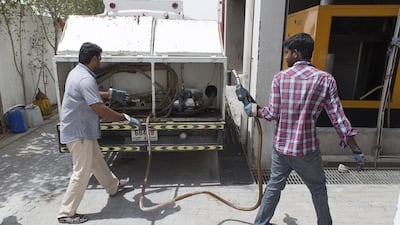Saad Moaswes prepared to go into the Bond Interiors office last Saturday, a company which his father, Ali, created.
“I wish I could join you,” the founder says. Ninety-year old Ali Moaswes founded the Sharjah company nearly 30 years ago and still goes to the office regularly.
Much has changed for Ali since he moved to this country in 1970. The Palestinian remembers a time when kerosene for cooking was purchased from suppliers with carts pulled by donkeys.
Now, the company looks forward to powering up its operations with wholesale diesel distributors arriving by truck daily.
As the UAE Government made the announcement to liberalise fuel subsidies last month, which came into effect on August 1, the big concern for most was the effect on transport costs. Yet diesel powers a great deal of operations including basic factory and home needs in the UAE.
While the fears over higher prices at the petrol pump may have some residents and business owners flustered, there are many who are benefiting.
Fuel subsidies are used to keep prices low for consumers while the government picks up the remaining actual cost. By liberalising subsidies in order to ease government spending, fuel stations began charging more than 20 per cent more per litre for petrol. However, the price of diesel actually came down nearly 30 per cent to Dh2.05 per litre in Dubai and the Northern Emirates from its previous Dh2.90 per litre.
Companies such as Bond Interiors believe the lower price for diesel – which is used to power generators at its Ajman labour camp – will offset the increased prices for petrol-driven transport. The company has three 400 kilowatt generators powering its 120-room labour camp in Ajman. About 350 gallons of diesel is used a day to help to provide lighting and air conditioning to the rooms as well as the electricity needed to power the tools used at the facility on-site that makes air conditioning ducts for projects.
For the Bangladeshi labourer, Ahasan Hashem, this camp is a step up. He has been with the company for eight years and at the Ajman camp for three years. This is the first camp Bond Interiors owns rather than rents, as it does with its other facilities in Abu Dhabi and Sharjah. “I like it better here [at the Ajman camp] because there is less heat,” says Mr Hashem. Each room at the camp is outfitted with an air conditioner and holds a maximum of four occupants.
Most of the country's power generation is via natural gas unless there is a shortage of the hydrocarbon, and then heavy oil and diesel are used. This occurred once years ago when Abu Dhabi used 3 per cent of diesel for power, according to the Abu Dhabi-based International Renewable Energy Agency (Irena).
“Although [today] the use of diesel for power in the Northern Emirates may be understated,” said Irena in its REmap 2030 UAE report.
Parts of the Northern Emirates are still considered remote and are off-grid – without access to the national grid or electricity lines. The Federal Electricity and Water Authority (Fewa) has struggled to meet the demand of rapid development and many places including restaurants, schools and private homes use diesel generators to produce electricity.
There have been expansion projects announced, including a series of solar power stations totalling 100 megawatts, to be built in various areas throughout the Northern Emirates over the next six years. Fewa could not be reached for further comments.
So for now, companies such as Bond Interiors continue to power up via diesel.
Out of Bond Interiors’ budget, about 6 per cent is spent on electricity – including diesel for the generators. The peak season for power in the region is always the summer months, and last month, Bond Interiors says it paid about Dh84,000 for diesel at wholesale distribution prices of Dh2 per litre. With the now lower wholesale rates, down 16 per cent to Dh1.68, savings of more than Dh13,000 a month can be achieved and annually of more than Dh140,000.
Since the humble beginnings of the company, Saad has helped carry on his father’s legacy by transforming Bond Interiors into an all-inclusive business that outfits high-end retail companies and five-star hotels with permanent fixtures such as carpentry work.
Ten years ago the company had close to 350 employees. Now the staff count is 2,300 and the company plans to grow its total business portfolio by 15 per cent this year.
Last year, profit came in at Dh200 million. To date the firm’s biggest contract has been a Dh50m project for the Oberoi Hotel in Ajman.
“Our business model is built about doing everything in-house,” says Saad, adding that the company will soon have a division specialising in marble fittings in its growing portfolio.
However, do not expect this small family business to grow into a chain-store name in the near future.
“The opportunity to jump to Dh300m [annually in revenue] at the moment is very easy,” says Steve Kiernan, the general manager of Bond Interiors.
“But we’ve seen a lot of companies that go from nothing to huge and disappear over night and we don’t want to be a company like that.”
lgraves@thenational.ae
Follow The National's Business section on Twitter





